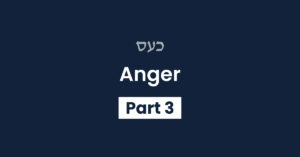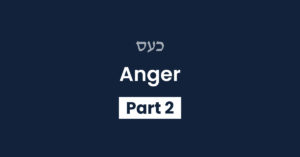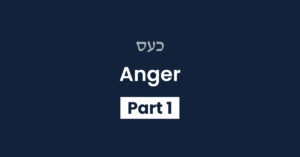Over the past few weeks, we have discussed several techniques to work on the middah of anger. First, we explored how forcing ourselves to speak in a calm tone of voice can help us keep our anger under control. Even when we are not in the midst of an anger-provoking situation itself, we can still strengthen this middah “muscle” by visualizing ourselves staying calm in all sorts of difficult situations.
Next, we suggested that when we’re feeling angry, we can try to see the situation from the other person’s perspective. By trying to understand why they acted the way they did, we can better come to terms with the situation, and feel more understanding, compassionate, and hopefully even forgive what the person did to hurt us.
Finally, we discussed how the most fundamental way to rid ourselves of anger is to work on our Bitachon. Instead of being angry at someone for causing us pain, and blaming them for hurting us, we can realize that everything comes from Hashem.Every amount of pain or pleasure that we experience is determined by Hashem. Yes, this person used their own free will to hurt us, and they are held responsible for their choice – but at the same time, I can realize that he or she was just a messenger of Hashem to cause me to experience whatever discomfort I was meant to experience.
Instead of directing my anger at this person, therefore, I am better off directing my thoughts to Hashem and turning to Hashem to resolve all of my difficulties.
Chanukah and Bitachon
This concept of Bitachon is actually very much related to Chanukah, and the month of Kislev as a whole.
Rav Tzadok HaKohen of Lublin1 writes that Kislev comes from the same root as Kessel which means “trust” as it says, “Ki Hashem Yihyeh V’kislecha V’shamar Raglicha Mi’laked – If you place your trust in Hashem, He will protect your feet from getting caught in a trap.”2
Rav Tzadok continues to explain that it was this trust in Hashem that enabled the Chashmonaim to defeat the Greek army in the times of Chanukah. Even though the Greek army was huge – much larger and more powerful than the Jewish army – the Chashmonaim realized that Hashem can do anything, so they placed their trust in Hashem to save them. When Hashem saw that they believed in Him, He came to their aid and miraculously saved the Jewish people.
The Chashmonaim realized that Hashem can do anything, so they placed their trust in Hashem to save them.
In fact, Rav Tzadok points out that this is the difference between Chanukah and Purim: On Purim, Hashem saved us through Nissim Nistarim – hidden miracles. A person who doesn’t want to believe in Hashem can fool himself into thinking that the Jews were saved on Purim through natural means. “Where do you see any miracle in the Purim story?” such a person might say. “You think it was a miracle that Haman was killed and the Jews were saved? Of course Achashveirosh killed Haman! Achashveirosh cared about his Queen Esther, and he therefore naturally wanted to save Esther’s nation from destruction.” A person who thinks this way is failing to Hashem’s hidden Hand in the story. He is turning a blind eye from noticing Hashem’s constant, yet hidden involvement in the Purim story – from getting Esther to be chosen as the new queen, and having Haman prepare the gallows which ultimately were used for his own death.
But on Chanukah, no one can deny the miracles in the story. It was an open, outright, obvious miracle that the tiny group of Chashmonaim were able to defeat the huge army of powerful Greeks. Likewise, it was an outright miracle that the pure oil – which was only supposed to last for 1 day – managed to last for 8 whole days.
The miracles of Chanukah were open miracles, that could not be explained by the rules of nature, to teach us that Hashem is above nature. If we place our trust in Hashem, then Hashem will show us that He is not limited to the rules of nature and can always come to help us. Nothing can ever stop Hashem from saving us – not even a big scary Greek army.
If we place our trust in Hashem, then Hashem will show us that He is not limited to the rules of nature and can always come to help us.
Even the Small Stuff
The Pnei Yehoshua3 asks an interesting question about Chanukah: Of course we understand why Hashem had to perform a miracle to save the Jewish people from the Greek army. But why did Hashem need to do the second miracle with the oil? According to halachah, the avodah in the Beis HaMikdash may be carried out even with impure oil, in pressing circumstances. The Jewish people could have just used impure oil to light the Menorah. So making the pure oil miraculously last for 8 days was actually an unnecessary miracle!
The Pnei Yehoshua answers that Hashem performed this miracle just to demonstrate His love for the Jewish people. By making the pure oil last for 8 days, Hashem showed the Jewish people how much He loved them and how much He wanted to enable them to carry out His mitzvos in an optimal way.
The Pnei Yehoshua answers that Hashem performed this miracle just to demonstrate His love for the Jewish people.
The message for us is clear: Hashem isn’t just here to help us out with with major, national issues, like when the Jewish people are threatened by our enemies, chas veshalom. Hashem wants to help us with the “small” miracles, too – helping us pass that test when we’re sure we’re going to fail, helping us get a parking spot in a crowded area, healing us from our virus, and giving us the miraculous strength to finish cleaning up the kitchen before Shabbos.
Hashem wants to help us with the “small” miracles, too.
Every event in our lives – big or small – is controlled by Hashem. We can always turn to Him to ask for help.
For the rest of this week, until the end of Chanukah, let’s tap into the power of these days and show Hashem that we have internalized the message of Chanukah. When we look into the little lights, let’s remember that just as Hashem made the oil miraculously last for 8 days, Hashem can do miracles to help us whenever we need it. Let’s turn to Hashem and ask for help in all of our needs and remind ourselves that nothing can stop Hashem from helping us – even when the situation seems impossible.
In the merit of our efforts, may we see before our eyes the clear fulfillment of the brachah “She’asah Nissim La’Avoseinu Bayamim HaHeim, Bazman Hazeh – Who performed miracles for our ancestors in those days, and in our own times, too.”
Sources: [1] Pri Tzaddik Rosh Chodesh Kislev 2; [2] Mishlei 3:26; [3] Pnei Yehoshua on Shabbos 21b
Your Challenge
Every day of Chanukah, ask Hashem for help, in your own words.
Try to choose an area where you feel desperate – you have no where else to turn, and it’s as if you almost need a miracle to make it happen.
FOR EXAMPLE:
- Ask Hashem to help you find a shidduch, or find a shidduch for a single you know.
- Ask Hashem to help you find a job that pays well and that you enjoy.
- Ask Hashem to heal you from some of your health issues, or heal someone else you know who is sick or experiencing discomfort.
- Ask Hashem to help one of your kids / nieces / nephews / siblings / cousins improve in their behavioral or developmental issues.
- Ask Hashem to help someone you know who is facing a dark difficult time in their life – help them pull themselves out of it or get the help they need.
- Ask Hashem to help you repair a relationship that seems beyond repair.




